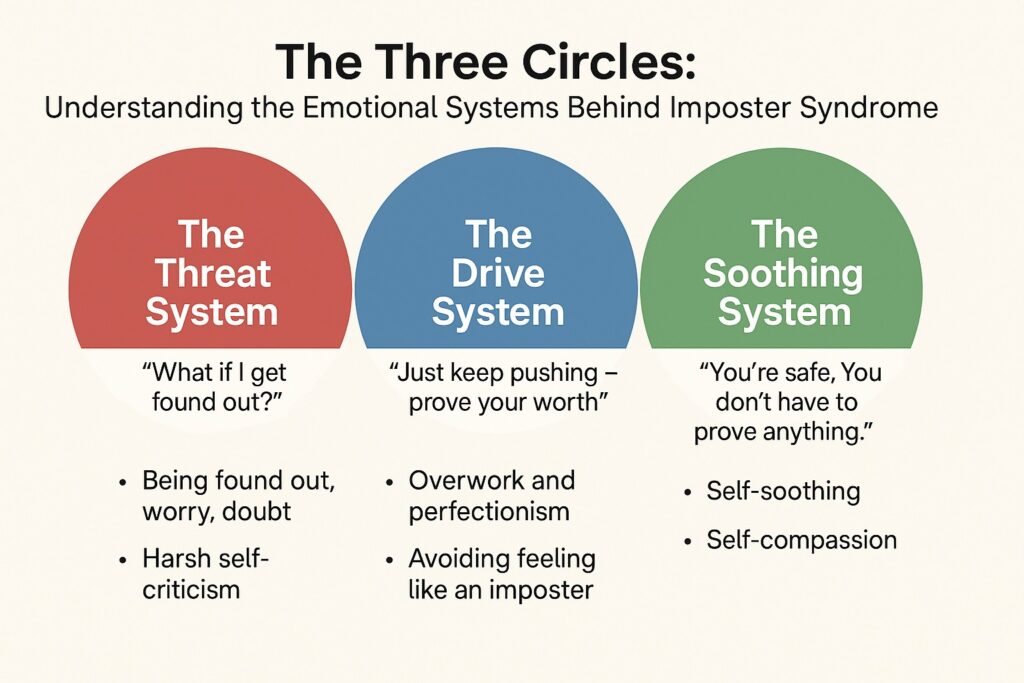The Three Circles: Understanding the Emotional Systems Behind Imposter Syndrome
When you’re caught in the grip of imposter syndrome, it can feel like a constant battle in your mind — the fear of being exposed, the pressure to prove yourself, the struggle to feel calm or confident. Compassion Focused Therapy (CFT) offers a helpful way to understand what’s happening underneath all this, using something called the Three Circles model.
This model maps out the three main emotion regulation systems we all have:
🔴 Threat, 🔵 Drive, and 🟢 Soothing.
Each system is important and plays an important role — but when they get out of balance, it can leave us stuck in cycles of self-doubt, anxiety, and overworking.

Let’s break it down in a way that relates directly to imposter syndrome.
🔴 The Threat System: “What if I get found out?”
This is your brain’s alarm system. It evolved to keep us safe from harm — scanning for danger, triggering fear, and getting us ready to fight, flee or freeze.
In imposter syndrome, the threat system is often working overtime, ever on the lookout for any potential threats. It whispers:
-
“What if you miss something important?”
-
“What if they realise you’re a fraud?”
-
“Don’t mess this up or you’ll be exposed.”
Even if there’s no real danger, the threat system treats mistakes, judgment, failure, and not knowing something as threats to your survival. It’s trying to protect you — but it ends up keeping you stuck in worry, avoidance, and harsh self-criticism.
And the more you listen to it, the more anxious and tense you feel.
🔵 The Drive System: “Just keep pushing — prove your worth.”
This system is all about getting things done — working towards goals, achieving, striving, performing. It gives us energy and motivation. And it can feel good when it’s in balance.
But with imposter syndrome, the drive system often gets hijacked by the threat system. Instead of moving towards values and growth, it starts working in service of fear:
-
You overwork to avoid being judged.
-
You perfect and polish until you're exhausted.
-
You chase one achievement after another, hoping this time you’ll feel confident or finally “enough.”
There’s nothing wrong with being motivated. But when the drive system is being run by fear — it leads to burnout, not fulfilment.
🟢 The Soothing System: “You’re safe. You don’t have to prove anything right now.”
This is the system most people with imposter syndrome have the least access to — and yet, it’s the one we need the most.
The soothing system is about feeling safe, connected, grounded. It’s what allows us to calm down, feel supported, and treat ourselves with care. It’s activated through compassion — from others, and from ourselves.
Without this system online, there’s no brake pedal. You’re either panicking or pushing — but never pausing.
Accessing the soothing system doesn’t mean giving up or not caring. It means recognising that you’re human. That you’re allowed to rest. That your worth doesn’t depend on constant achievement or flawlessness.
What Happens When the Threat and Drive Systems Take Over?
When your threat system says, “You’re not good enough,” your drive system responds with, “Work harder, prove yourself.”
It’s a Red–Blue loop. You swing between anxiety and overdrive. Worry and overwork.
All the while, you feel tense, depleted, and never quite good enough.
And because your soothing system is underused, there’s no internal voice saying,
“This is hard — and that’s understandable.”
“You’re trying — and that counts.”
“You don’t have to do this perfectly.”
That absence makes it harder to reset, reflect, or feel supported — even when others try to reassure you.
Rebuilding the Green Circle: How Self-Compassion Breaks the Cycle
The key isn’t to eliminate the Red or Blue circles — they’re part of being human.
The goal is to rebalance. To bring more Green in.
That might mean:
-
Noticing when you’re stuck in threat or drive mode
-
Practising self-soothing skills (like breathing, grounding, mindful pauses)
-
Talking to yourself with warmth and understanding, being encouraging rather than critical
-
Accessing support from others rather than keeping things to yourself and feeling alone
-
Using your values to guide your behaviour rather than fear
It’s not about being “soft” — it’s about being effective by giving yourself the internal resources to handle challenges without running on fear and pressure alone.
Final Thought
Imposter syndrome isn’t a sign that something’s wrong with you — it’s often a sign that your threat system is dominant, your drive is overloaded, and your soothing system is underused.
By understanding these emotional systems — and learning how to work with them — you can begin to step out of the loop of self-doubt, and move towards a more compassionate, balanced way of living and working.
Let the Green Circle be your reminder that you don’t have to earn your worth — it’s already there.

